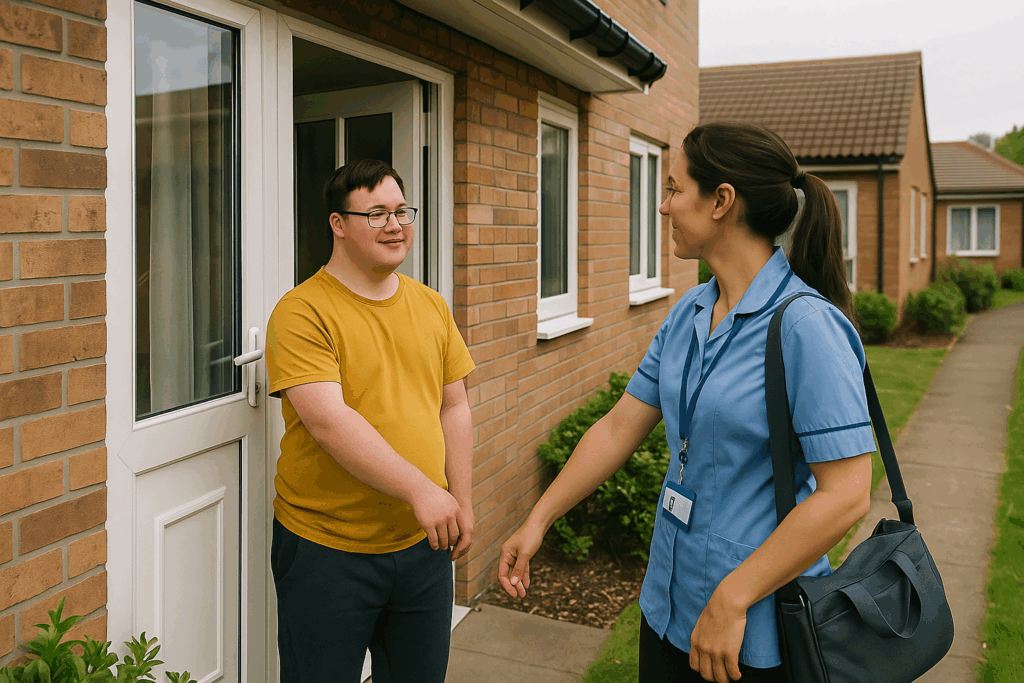DBS Checks for Supported Living
Hospitals • Care Homes • Domiciliary Care • Health & Social Care Recruiters • Dental Surgeries • LD/A & ND Support • Health and Care Staff Agencies • Live In Care • GP Surgeries • Supported Living • Allied Health Services • Pharmacies • Day Centres • Locum Agencies • Opticians • Private Ambulance • SEND Specialists •
Looking to do DBS Checks for Staff? - Checks from £3.00 each
DBS Check for Supported Living Staff within 48 Hours
Your organisationcan register quickly with our platform for free and start benefiting from our superior DBS Check services
Rapid DBS
DBS checks for Supported Living are processed quickly and provided nationwide. A modern, intuitive platform ensures efficient handling and prevents unnecessary delays.
Cost Effective
DBS checks for Supported Living are made straightforward through our platform, which helps lower overall costs. Consequently, these checks can be up to 70% more affordable than those offered by other providers.
Established
With over 18 years of experience in providing DBS checks for Supported Living, a trusted and proven service has been established. Thousands of customers continue to value this long-standing expertise.

DBS Checks for Supported Living are an essential part of safe recruitment
Why DBS Checks for Supported Living are essential
What Supported Living Services Offer
Supported Living services provide tailored help with daily living and personal care. They may also include healthcare support. The goal is to help people live safely and independently. Individuals can stay in their own homes or in shared accommodation.
Why Trust Matters in Supported Living
Staff work closely with vulnerable adults every day. Therefore, a high level of trust is always required. Employers must take clear steps to confirm each worker’s suitability. This ensures both safety and compliance with care standards.
The Role of DBS Checks for Supported Living
DBS checks for Supported Living give vital reassurance. They confirm that applicants do not have concerning criminal records. In addition, these checks prove that staff are legally eligible for regulated roles.
Risks of Skipping DBS Checks
Without DBS checks for Supported Living, people may face unnecessary risks. Vulnerable adults could be exposed to harm. Furthermore, employers risk breaching essential regulatory standards and losing credibility.
Understanding DBS Checks for Supported Living Staff
What a DBS Check for Supported Living Reveals
A DBS check for Supported Living staff shows criminal convictions, cautions, warnings, or barring restrictions. It helps employers identify risks before hiring.
Why DBS Checks Are Essential in Supported Living
Staff provide direct care and support to vulnerable people. Therefore, safeguarding risks can be significant. DBS checks protect residents and maintain safe environments.
Benefits of Completing the Correct Level of DBS Check
By completing the right level of DBS check, providers create a safer workforce. Families feel reassured, and the provider’s reputation remains protected. This process builds trust across the service.
Which Level of DBS Check Applies to Supported Living
Several DBS check levels exist for different roles. However, Enhanced DBS checks are most common in Supported Living. The personal and close nature of the work makes them essential.
How DBS Checks Support Recruitment Decisions
DBS checks for Supported Living provide detailed background information. This enables employers to make informed and responsible hiring decisions with confidence.
Matching DBS Levels to Roles – What DBS Level do Supported Living Staff need?
How DBS Check Levels Depend on Staff Roles
The correct level of DBS check in Supported Living depends on the role. Care staff who deliver personal care, administer medication, or support finances always require an Enhanced DBS check. This check must include the relevant barred list for adults, children, or both, depending on service users.
Supervisors and Managers in Supported Living
Supervisors and managers who oversee these regulated activities also need the same Enhanced DBS check. This ensures consistent safeguarding across all levels of responsibility.
Why Standard DBS Checks Rarely Apply
Unlike Care Homes, Supported Living does not usually employ office or administrative staff on site. As a result, Standard DBS checks are rarely relevant. All frontline staff engaged in regulated activity must have Enhanced DBS checks with the correct barred list.
Ensuring Workforce Safety and Compliance
This approach ensures that every Supported Living worker is thoroughly vetted. It safeguards vulnerable people and keeps providers compliant with legal and regulatory standards.
Regulated Activity in Supported Living
Who Regulates Health and Social Care Services
Most Health and Social Care services in England are regulated by the Care Quality Commission. In Wales, regulation comes from the Healthcare Inspectorate Wales and the Care Inspectorate Wales.
Why Regulators Require Enhanced DBS Checks
All three regulators demand safe and effective recruitment. As a result, all frontline roles in Supported Living need Enhanced DBS checks. These checks ensure unsuitable individuals cannot enter support roles.
How DBS Checks Protect Vulnerable People
DBS checks for Supported Living safeguard adults by screening applicants thoroughly. They help prevent unsuitable candidates from gaining access to vulnerable service users.
What Counts as Regulated Activity
The law defines certain tasks as regulated activity. These roles demand the highest level of safeguarding and screening. In Supported Living, regulated activity covers staff who provide personal care, administer medication, or deliver essential daily assistance.
Transport and Other Regulated Duties
Even supporting service users with transport to health or care appointments may be regulated activity. Because these tasks involve high trust, Enhanced DBS checks with the relevant barred list are legally required.
When Domestic Tasks Become Regulated
General domestic tasks are not always regulated. However, handling money for individuals receiving Health or Social Care is usually defined as regulated activity.
Why Understanding Regulated Activity Matters
Understanding regulated activity is vital for Supported Living providers. It directly determines the correct level of DBS check required by law.
Adult Workforce vs. Children’s Workforce
How Service Users Affect DBS Requirements
In Supported Living, the type of service users determines staff DBS requirements. For adult-focused services, staff need Enhanced DBS checks with an Adult’s Barred List search.
When Services Include Young People
Some Supported Living providers also support young people under 18. In these cases, staff engaged in regulated activity with children must be checked against the Children’s Barred List.
Why Checking Children’s Barred List Is Critical
It is essential to confirm whether service users include children. Employing anyone barred from working with them is a serious criminal offence and a major safeguarding risk.
When Both Adults and Children Receive Support
For providers supporting both adults and children, staff must be checked against both barred lists. This ensures full compliance and safeguarding across the workforce.
Why Providers Must Review Their Service Model
Providers should carefully review their service model when registering with the CQC. The client group supported will directly determine the DBS requirements for the workforce.
The Barred Lists Explained
What the Barred Lists Contain
The Disclosure and Barring Service maintains two barred lists. These are the Adult’s Barred List and the Children’s Barred List. A person may appear on one or both lists depending on their history.
Who Cannot Work in Supported Living
If a prospective employee is on a barred list, they cannot be employed in related roles. For example, someone on the Adult’s Barred List cannot legally work with vulnerable adults in Supported Living.
Why Barred List Checks Are Essential
The barred list check is a vital safeguard. It prevents unsuitable individuals from entering trusted care roles. This protects both service users and providers.
Legal and Reputational Risks of Non-Compliance
For Supported Living providers, barred list compliance is critical. Non-compliance can result in serious legal action and lasting reputational damage.
The Adult First Check Explained
Why Adult First Checks Are Used in Supported Living
Many Supported Living roles involve regulated activity with adults. These tasks include personal care, medication support, and daily living assistance. Staff in these positions require an Enhanced DBS check with the Adult’s Barred List. The Adult First Check helps speed up recruitment in such cases.
How the Adult First Check Works
The Adult First Check is requested with an Enhanced DBS check that includes the Adult’s Barred List. It provides an initial result, usually within 72 hours. The result confirms whether the applicant is not on the barred list or if more checks are needed.
When Staff Can Begin Work
If the Adult First Check result is clear, staff may begin supervised work while waiting for the full DBS certificate. If further investigation is required, the applicant cannot start until the full certificate is issued. This step prevents risk without delaying safe recruitment unnecessarily.
Why This Service Benefits Supported Living Providers
The Adult First Check is valuable for providers who need staff quickly to meet urgent care demands. It offers reassurance while maintaining compliance with safeguarding rules.
Costs and Limitations of the Adult First Check
There is no cost difference between an Enhanced DBS check with or without the barred list. However, requesting an Adult First Check involves a small extra fee. Currently, there is no rapid-check service for the Children’s Barred List.
Meeting CQC Requirements for Supported Living
Safe Recruitment and CQC Registration
When registering with the Care Quality Commission (CQC), safe recruitment is a key requirement. Providers must show clear policies to prove that every Supported Living staff member is properly vetted.
Keeping Records of DBS Checks
Evidence of DBS checks must be stored in staff records. Providers should also decide how often to repeat checks. Many services recheck staff every three years or use the DBS Update Service for ongoing monitoring.
Impact of Failing to Meet Requirements
Failing to complete the correct DBS checks, or keeping poor records, can harm CQC inspection ratings. Lower ratings affect reputation and reduce the ability to secure contracts.
Why DBS Checks Demonstrate Quality and Safeguarding
By prioritising DBS checks for Supported Living staff, providers show strong commitment to safeguarding. This also demonstrates dedication to delivering safe, high-quality care.
Important points at a glance…
- All frontline Supported Living staff delivering personal care, administering medication, or managing finances require an Enhanced DBS Check with the relevant Barred List (Adults, Children, or both).
- Supervisors and managers overseeing regulated activities also need Enhanced DBS Checks, since they hold responsibility for safeguarding.
- Supported Living services rarely employ office-based staff. Therefore, Standard DBS Checks are generally not relevant, and Enhanced DBS remains the norm.
- Tasks such as personal care, healthcare support, and even transporting service users to appointments count as regulated activity, requiring Enhanced DBS Checks by law.
- General domestic duties may not be regulated. However, if staff handle money for service users receiving Health or Social Care, this is typically classed as regulated activity and requires Enhanced DBS clearance.
- Staff working only with adults must be checked against the Adult’s Barred List. Providers also supporting children must ensure staff are cleared against the Children’s Barred List.
- The Adult First Check can speed up recruitment, providing an initial barred list result within 72 hours so staff may start under supervision while awaiting the full DBS certificate.
- CQC registration requires evidence of safe recruitment, meaning DBS checks must be carried out, recorded, and kept up to date. Many providers use the DBS Update Service or repeat checks every three years.
